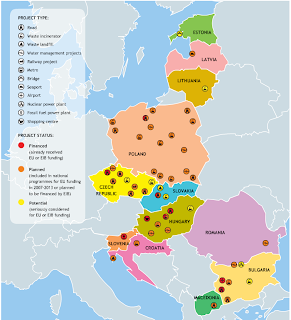
EU and EIB Funding in Central and Eastern Europe: Cohesion or Collision?
Nos últimos anos tem sido frequentes os estudos e notícias sobre maus usos ou desperdício de fundos comunitários.
Vi este estudo que antecipa a má utilização de fundos estruturais na Europa de leste. Pode consistir um sinal fraco ou o reforço da tendencia de contestar as decisões políticas nesta matéria.
Achei interessante referir isto uma vez que foram referidos nas últimas aulas temas sobre prioridades nos fundos estruturais para Portugal.
Curiosamente este estudo é proveniente de uma NGO, a bankwatch.
Excertos:
"If we look at energy efficiency and renewables, the guidelines are not so bad, because energy efficiency and renewables are [...] one of the twelve priorities. [...] but only 2% of the money is allocated for this."
"We have a pretty-well established consensus that development and minimising greenhouse-gas emissions can be reconciled. At the same time we are investing money in a way that does not contribute to this kind of development, and this is the basic problem.
"We are missing the opportunity to put money behind this consensus, behind this strategy of low-carbon development."
"In the transport sector, if you want to tackle climate change, you need to [...] look at the fuel economy and technologies, and [...] what we do about the general demand for transport, and the balance between modes of transport. If you only look at technology, fuel economy and so on, the number of cars and trucks will still increase quickly."
Entrevista ao responsável pelo estudo:
"EU Structural Funds: 'Biggest opportunity wasted' "
"National spending plans under renewed fire "
Site da bankwatch: bankwatch
"The CEE Bankwatch Network is an international non-governmental organisation (NGO) with member organisations currently from 12 countries across the central and eastern European region. The aim of the network is to monitor the activities of the international financial institutions (IFIs) which operate in the region, and to propose constructive alternatives to their policies and projects in the region."




Sem comentários:
Enviar um comentário